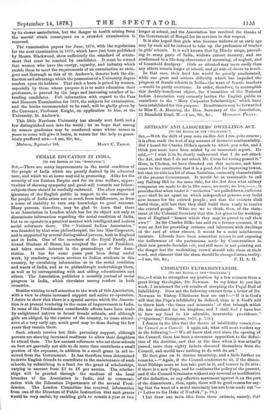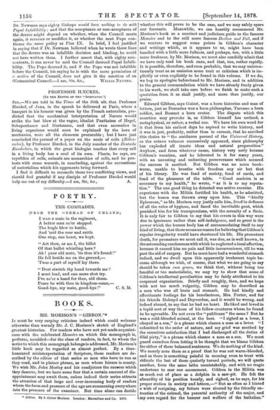UNDILUTED ULTRAMONTANISAL
(TO THE EDITOR OF THE "SPECTATOR."] SIR,-1 wish to strengthen my position by a few extracts from a great living theologian, Dr. Newman. In my letter to you last week, I mentioned the evil results of accepting the Papal Bull of Infallibility. Does not the following extract from a letter of Dr. Newman to Bishop Ullathorne bear me out ?—"H it is God's will that the Pope's infallibility be defined, then is it God's will to throw back the times and moments' of that triumph which He has destined for his kingdom, and I shall feel I have but to bow my head to his adorable, inscrutable providence." (6' Quirinus," Rivingtons, 1870, p. 338.) I demur to the idea that the decree of infallibility comes from the Council as a Council. I again ask, what will most readers say to the following ?—" We all know that ever since the opening of the Council, there has been a strenuous opposition to the defini- tion of the doctrine, and that at the time when it was actually passed, more than eighty fathers absented themselves from the Council, and would have nothing to do with its act."
He then goes on to discuss unanimity, and a little further on remarks,—" Again, if the Council continues to sit, if the dissen- tient Bishops more or less take part in it, and concur in its acts ; if there is a new Pope, and he continues the policy of the present, and if the Council terminates without any reversal or modification of the definition, or any effective movement against it on the part of the dissentients; then, again, there will be good reason for say- ing that the want of a moral unanimity has not been made out."- (" Letter to the Duke of Norfolk," p. 98.)
I but draw one main idea from these extracts, namely, that Dr. Newman says eighty Bishops would have nothing to do with Papal Infallibility ; and that the acceptance or non-acceptance of the decree might depend on whether, when the Council meets again, it reverses or modifies it, or whether the next Pope con- tinues the same policy as PHIS IX. In brief, I feel justified in saying that if Dr. Newman believed when he wrote those lines that the decree was an infallible decision and binding, he could not have written them. I further assert that, with eighty non- contents, it can never be said the Council decreed Papal Infalli- bility. The Pope decreed it, and if the Pope was not infallible before the Council, his saying he is with the mere permission of a section of the Council, does not give it the sanction of an (Ecumenical Council.—I am, Sir, &c., WILLIS NEVINS.































 Previous page
Previous page